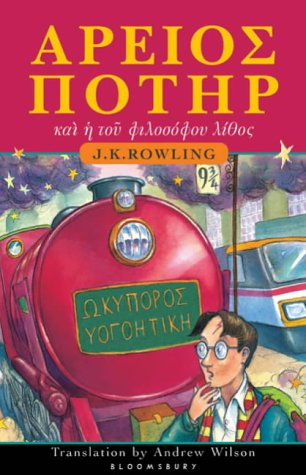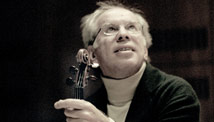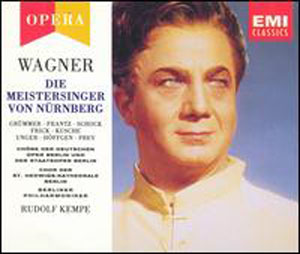In a rare interview, the conductor Claudio Abbado talks about his state of health. Ravaged by stomach cancer 11 years ago, he has adjusted his lifestyle and appears, at 78, to be in good condition. He takes a gentle question from Julia Spinola of the Frankfurter Allgemeine Zeitung, and deals with it:
Ist es indiskret, wenn ich Sie frage, wie es Ihnen mittlerweile gesundheitlich geht? Aussehen tun Sie jedenfalls blendend.
Es geht mir viel besser. Ich brauche natürlich sehr viel Disziplin, vor allem beim Essen. Aber auch beim Arbeiten. Ich gebe nicht mehr so viele Konzerte: Berlin, Luzern, Orchestra Mozart – das war es schon fast. Und dort entstehen dann auch die Aufnahmen.
(It’s going much better for me. Naturally, I need to observe strict discipline, especially in how I eat. And in my work. I don’t give many concerts any more: Berlin, Lucerne, the Mozart orchestra – that’s just about it. And then there are the recordings.)
That’s a pretty positive outlook, and very good news for all who appreciate his intense, introspective way with great works of music.

Claudio Abbado, by Burkhard Neie (FAZ.net)
After months of confrontation, boycott and international condemnation, it looks as though the men behind the Brazil Symphony Orchestra have taken the first step towards peace.
According to a well-informed report in the Estadao of Sao Paolo, the board of the OSB have stripped conductor Roberto Minczuk of his absolute power to hire and fire.
There is some question as to whether he still holds the title of artistic director. A three-man advisory committee has been appointed to deal with matters arising from the firing of 33 musicians, and Minczuk’s failure to replace them during an expensive international search. Candidates were being offered up to $9,000 a month to join the troubled orchestra and most declined. According to one industry source, the Brazilian Ministry of Labour took measures to deny work permits to foreign replacements.
This is a step forward by the board, small but potentially helpful. Minczuk has not confirmed any reduction in his position, but the board move is a public humiliation for a headstrong maestro who made head-on confrontation his principal policy. His position must now appear to be in jeopardy.

A musician in north-east London, David Hoskins, has sent me a project his orchestra has undertaken with local schoolchildren, showing them a video performance of the Resurrection symphony and harvesting their creative responses. In six sessions over three weeks, the Year 5 pupils in Chapel End Junior School, Walthamstow, heard sections from the symphony, discussed their reactions, made their own art works and composed music – a selection of which will be played by the orchestra before tonight’s performance of the work in Walthamstow Assembly Hall.
You can download a sample of their work here.
One pupil wrote:
I have to leave now
I will never forget you
The sun will come up
– as good an analysis of Mahler as you could wish for. If you’re free tonight, there’s Mahler from the Forest, where he began.

In a Wall Street Journal cover story this weekend, I describe the way J K Rowling transformed the reading habits of children and young adults, an impact unequalled since Charles Dickens with whom she shares other characteristics.
The Harry Potter books have been translated into 67 languages, which several sources maintain is the greatest number of tongues since the Bible. A sharp-eyed reader suggests that there may be five or six other works of greater universality – John Bunyan, the Quran, Le Petit Prince, Tintin and Pinocchio.

That would still leave Harry Potter the most translated work by any living author, but I wonder if anyone can help clarify the position more precisely.
Here‘s a wiki source to get you started.


The name’s Solti.
Claudia Solti.

She’s the daughter of King Georg and she’s in the thick of rehearsing Britten’s A Midsummer Night’s Dream, opening at the Mariinsky in St Petersburg on July 23. Her father gave its London premiere with the Royal Opera House in 1961.
I think it’s her major house debut. Valery Gergiev liked and admired old King Georg and took over the World Orchestra for Peace when he died. Nice to see the link extended.
The great Czech violinist Josef Suk has died, aged 81.
He was a great-grandson of Antonin Dvorak and grandon of his son-in-law, also Josef Suk, a virtuoso performer and composer of Asrael.
He recorded all the major concertos for the national label, Supraphon, and had occasional excursions on foreign labels. For me, his most memorable performances were the Janacek sonata and the Alban Berg concerto.
Requiescat in pace.

According to William B. Grant of the Sunlight, Nutrition, and Health Research Center in San Francisco and Dr. Stephen Pilz of the Medical University of Graz, Mozart died of a Vitamin D deficiency, causwed by lack of sunlight.
If only he had composed more in the garden…

Vitamin D theories are very fashionable at the moment, so much so that some countries ran out of supplements last winter. Three jabs, and Wolfie might have finished that Requiem. Yeah, right.
Most serious scholars still agree that Mozart died of a surfeit of marzipan balls.
Read more: http://www.upi.com/Health_News/2011/07/04/Vitamin-D-lack-linked-to-Mozarts-death/UPI-17741309836872/#ixzz1RKi3kDOl
And here‘s some further analysis
The violinist Gidon Kremer has spoken out on CNN on behalf of Putin foes Mikhail Khodorkovsky and Platon Lebedev, whom he considers to be political prisoners. Both have spent eight years in jail on surious charges. Here’s Gidon’s statement on their behalf:

http://edition.cnn.com/2011/OPINION/07/05/kremer.musician.russian.prisoner/
The composer Malcolm Forsyth has died in Edmonton, aged 74. A South African, he emigrated in 1968 and enjoyed considerable success in Canada. His daughter, Amanda, principal cellist in the National Arts Centre Orchestra, is married to its conductor, Pinchas Zukerman.
#
The light tenor Gerhard Unger has died in Stuttgart, aged 94. A Bayreuth stalwart in Die Meistersinger, he appeared at La Scala, Salzburg and the Met.

The composer of Two Boys, discussing the Opera North saga, gives a remarkably frank and sensitive account of how they dealt with sex talk when underage kids were around.

Here’s an extract:
Craig Lucas and I have just gone through an idyllic collaborative process with the ENO and the Met putting togetherTwo Boys. Anybody who wanted to read the libretto could read it, and all the adults in the production were charged by our director, Bart Sher, to take care of the kids (we had a dozen actors and two singers), making sure nobody was uncomfortable. Bart spoke with the parents of the kids — particularly the singing ones — well in advance of the production period. And in the interests of full disclosure here, allow me to excerpt for you some moments from the opera:
Congressman. did any girl give u a haandjob this weekend?
Page. i’m single right now
Congressman. did u spank yourself this weekend?
Page. no
Congressman. in the shower where do you throw the towel?
Page. in the laundry
Congressman. just kinda slow
Page. it works
(If you don’t know the reference, I’m not going to tell you, but it’s a matter of public record).
Read the whole blogpost here.
Note that Nico does not join the media gang-rape of Opera North.
Three months ago, it looked as if the London Mozart Players were going out of business. Refused Arts Council funding and short of £50,000 to pay the musicians, things were looking dire when the orchestra launched an emergency appeal at Buckingham Palace.
Today, they have given me the news that not only has the target been reached but they’ve had an additional donation of £50,000 and a commitment of long-term support from Croydon Council, which owns the hall where they play. This is welcome news in tough times.

Here’s the statement from managing director Simon Funnell:
The London Mozart Players is delighted to announce the successful
outcome of its fundraising appeal, launched by Associate Conductor
Hilary Davan Wetton on 20 April 2011. As reported in the national
press at Easter, the orchestra was facing closure unless urgent funds
were raised over the summer.
Two months on, the appeal is on track to reach its target of £50,000
by the end of July.
The LMP’s Managing Director, Simon Funnell, said: “The response
from the public has been hugely generous and incredibly heart-warming
with dozens of donations ranging from just a few pounds to over
£5,000. We have been very touched that, at a time when everyone is
feeling the squeeze of austerity, people care enough about the LMP to
ensure our survival.”
A dinner at Buckingham Palace in early June hosted by the LMP’s
Patron, HRH The Earl of Wessex, also raised a significant amount of
income. In addition to the main appeal, a generous individual donor
has made a further donation of £50,000. The London Borough of
Croydon, home of the orchestra for over 20 years, has also agreed to
continue to support the LMP until March 2013, committing £180,000
over the two-year period from April 2011.
But it isn’t just on the financial front that the LMP has good
news. The appointment of Marieke Blankestijn as its new Leader, who
will share the role with current Co-leader Susanna Candlin, has also
been announced. Currently Leader of the Chamber Orchestra of Europe,
Marieke worked for many years with the LMP’s Music Director Gérard
Korsten.
Gérard Korsten, the LMP’s Music Director, said “I am delighted
to be working with two such fantastic violinists in Susie and Marieke;
they will be a formidable team for the orchestra and their joint
appointment brings the orchestra both freshness and continuity.”
Simon Funnell commented: “2011 really has been a roller-coaster of
a year but this fantastic appointment, which comes on top of the news
of Roxanna Panufnik’s appointment as the orchestra’s new Associate
Composer, shows that the London Mozart Players is still a vibrant and
relevant orchestra, more than sixty years after it was founded.”
From a bleak picture just a few months ago, the LMP is now looking
towards a brighter future, with a new series of concerts beginning at
St John’s, Smith Square in October, sponsored by M&G Investments, as
well as continuing its relationship with Orchestras Live, Fairfield
Halls and its many supporters around Croydon and the south east.
The twitter storm that has erupted around Opera North’s cancellation of a new work for schools by Billy Elliot creator Lee Hall has, so far, generated far more heat than light.

Hall, seen here on BBC Breakfast, started the ball rolling with a call to the Guardian on Friday, asking if he could write an article about the censorship he was facing in Leeds. He had been asked to cut a couple of lines of text. When this blew into total cancellation, the playwright earned global martyr status and the opera company became a whipping boy for every egalitarian voice from Jeannette Winterson down. Opera North was suddenly the new Stonewall and normally sane voices were calling for a boycott.
Hang on a minute. This is opera, right? Gay people are the single largest non-organised component in an opera house, after chorus. No opera house on earth would knowingly engage in anti-gay discrimination. This very month, there is a gay-themed opera, Two Boys, at the London Coliseum which breaks the barrier of under-age sex. Opera North is innately part of an artform that cannot risk homophobia.
Much of the information has come from secondary and tertiary sources. The New York Times story did not speak to a single person or institution involved. Common sense and journalistic practice went right out of the window. ‘It’s about silencing gay people and wanting to wipe them out of being in this play,’ said Hall.
So what really happened? From the evidence to hand, it appears the local authority objected to a couple of lines, the librettist took umbrage and the whole thing was blown out of all proportion. Opera North has accused Lee Hall of showboating.
As matters stand, it appears that the opera – Beached – may yet go ahead in those schools where parents are happy to see it.
After all this fuss, everyone will want to see it. Lee Hall has got what he wanted, unlimited exposure for the script he believes in.
There’s also a composer, by the way. His name is Harvey Brough. In most operas, the composer comes first. He seems to have been forgotten.
That’s not the only priority that has got grotesquely skewed in this sorry, overheated saga.














